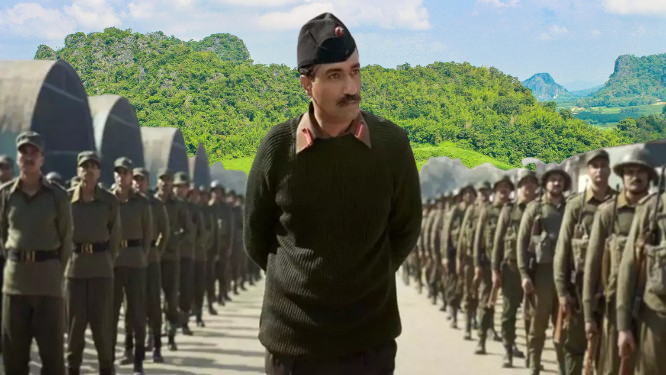
Movie Review of “Sam Bahadur”: Director Meghna Gulzar’s latest theatrical masterpiece, “Field Marshal Sam Manekshaw,” vividly portrays the romance and complexity of Sam Bahadur’s life.
Sam Bahadur has a lot going for it. For director Meghna Gulzar, known for the splendid successes of “Talvar” (2015) and “Raazi” (2018), this marks another feather in her cap.
Featuring Vicky Kaushal, well-acquainted with depicting determined individuals tackling national threats, as evidenced by his commendable performances in “Uri: The Surgical Strike” (2019) and “Sardar Udham” (2021), Sam Bahadur explores the illustrious journey of Field Marshal Sam Manekshaw.
He survived being shot nine times by a Japanese soldier during World War II, making him almost a mythical figure.
As I settled into my seat, changing positions and eagerly awaiting that decisive moment of cinematic brilliance, writers Bhavani Iyer and director Meghna Gulzar attempt to make you laugh. Yet, in the end, Sam Bahadur’s story transcends your understanding entirely.
I walked out of the movie hall feeling as though I had just received a fresh retelling of Manekshaw’s life, akin to a prestigious annual online list recounting his exploits—honoring the country’s former Prime Minister with humility, celebrated feeder of thick handlebar mustaches, and dispenser of beads and battlefield wisdom.

The biopic follows a sketch style, primarily adhering to an episodic structure and constrained by truths and narrative lengths. What makes this style memorable is how it places the central conflict of any film and where it stands.
In the open-hymer that unfolded earlier this year, the challenge was to cancel the protagonist’s security clearance, and how the film wrapped itself around that issue. Sam Bahadur has chosen to tell the story of Sam Manekshaw’s renowned hero in recent times, without sensationalizing or sensationalizing the recent controversy surrounding Manekshaw’s portrayal as a fictional and real-life character.
In fact, Yayha Khan’s portrayal by Pakistani counterpart, Mohammad Jishan Ayub, provides more intricacies (but not without some scary aging makeup and prosthetics). If there’s one thing that keeps you hooked to this film, it’s Vicky Kaushal.
After a somewhat disappointing year for the actor, especially in characters written for him in “Govinda Nam Mera,” “Bhoot Part One: The Haunted Ship,” and “The Great Indian Family,” Sam Bahadur sees Vicky Kaushal working his magic.
His portrayal of Manekshaw, seen recently in “Sardar Udham” and “Raazi” (2018), combines the swagger, influenced tone, and broadly known natural charisma into a satirical charm that might feel like a parody but consistently maintains a strong grip on the character.

Sanya Malhotra, as Sam’s attractive wife Silloo Bodhe, brings emotional sustenance to the Manekshaw family, complementing his effervescent energy recently displayed in “Love Hostel.” The film repeatedly suggests that Manekshaw’s victory has come at the cost of Silloo and his daughters. However, Fatima Sana Shaikh’s portrayal of Indira Gandhi is quite unstable, with casting preferences being largely a matter of taste.
The film’s music is fast, disorienting, and tasteless (war songs continue to be surprisingly bland and formulaic), which is impressive considering the clear musical talent of Shankar-Ehsaan-Loy and the last fantastic collaboration with Gulzar in “Raazi.”
In addition to the medium background score, Sam Bahadur effectively uses archival footage to maintain the narrative and bring a documentarian seriousness to the proceedings, but it also contributes to the film’s inert realism and staccato time leaps.
In various parts of Manekshaw’s life, Sam Bahadur can be seen as sweet and appealing, creating the story of the film. They have been shot, designed, and acted very well (credit to cinematographer Jay Patel for his work on aerial attacks and war scenes in Burma) and might make this larger-than-life vignette reel worth watching in cinemas.
But the threads that tie them together, such as the playful banter between Manekshaw taking his radio set to the kitchen, the principal figure and his lady in the changing room—where they express an undeniably popular proclamation about Gorkhas and fear—feel disconnected and need a strong hand to avoid some slack in the film due to its grandiose and upbeat tone.
Cast: Vicky Kaushal, Sanya Malhotra, Fatima Sana Shaikh, Mohammad Jishan Ayub, Neeraj Kabi
Direction: Meghna Gulzar